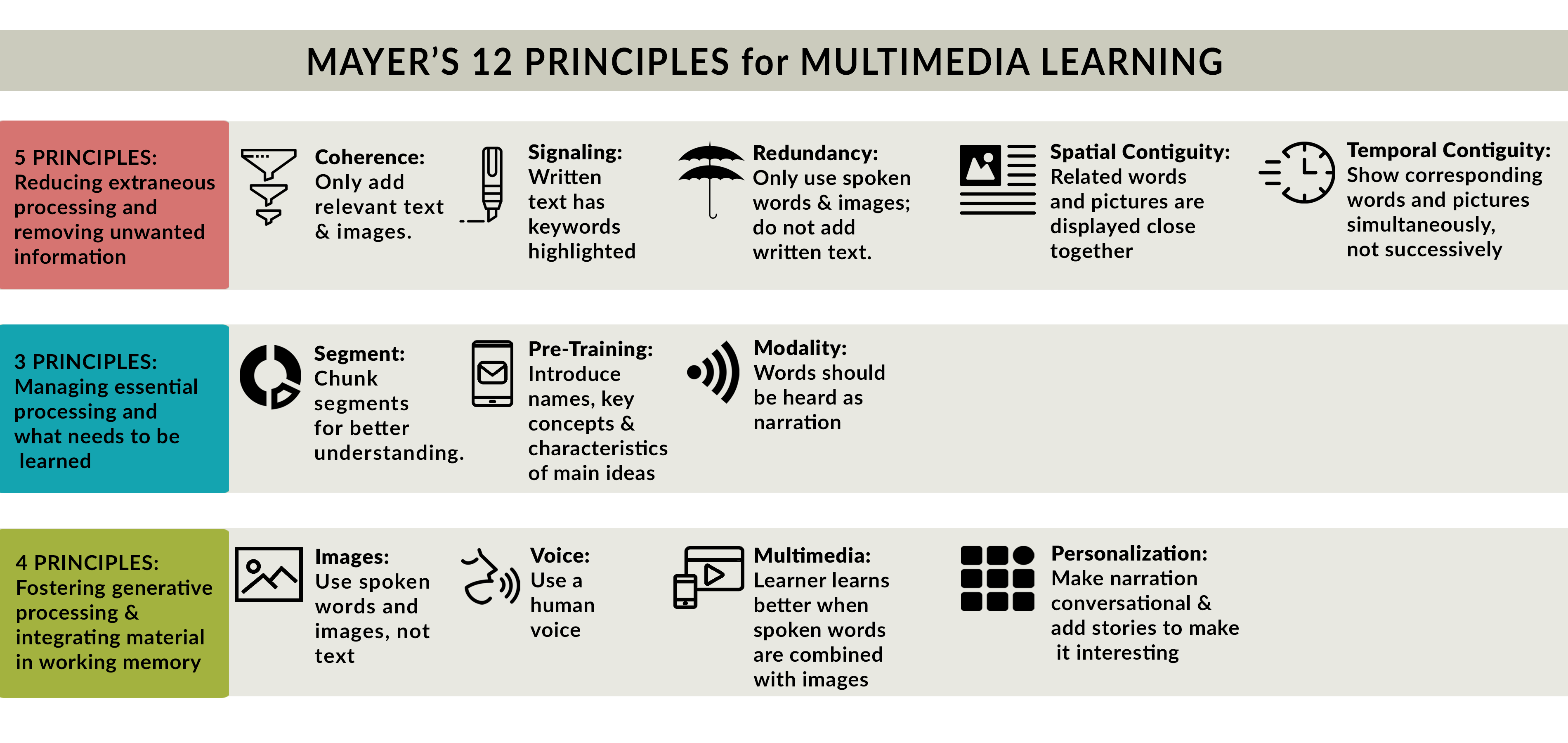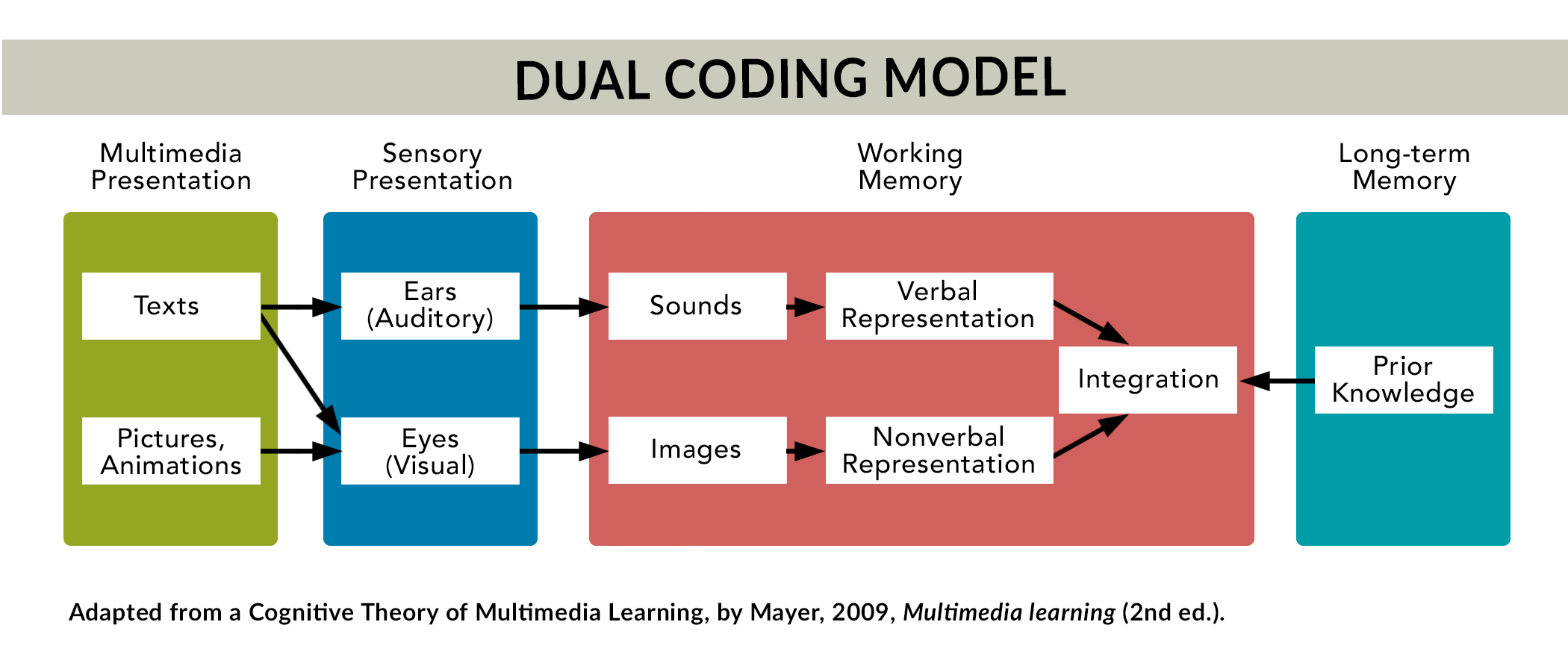
Exploring how cognitive science principles can be utilized to improve the organization and processing of information to facilitate learning may be helpful for instructors. Some simple but helpful concepts are described below.
Cognitive Theory of Multimedia Learning
Mayer (2008) developed this theory to provide guidance on how to create effective multimedia presentations for learning. The theory is predicated on three assumptions:
1. The dual-channel assumption proposes that people process information along two distinct, additive channels in working memory. Pictures and animations are perceived through the visual channel as nonverbal, image representations, while spoken words are perceived through the auditory channel as verbal, sound representations. Nonverbal and verbal representations are integrated in the working memory and ultimately transferred into long-term memory.
What this means for instructors: In a class presentation, this translates into using more imagery, whether a photograph or diagram, with audio or speech and less text, aiming to balance the information presented along the two channels to facilitate processing and learning. Consider how easy or difficult it would be for you to process the information about the dual-channel assumption if it was only presented to you in written or spoken format as opposed to also having access to the diagram below.
2. The limited-capacity assumption suggests that people's working memory can only process a certain amount of information at the same time (about 5-7 chunks of information). People who have strong metacognitive skills, can increase their cognitive resources and working memory capacity (below are tips on how we can help learners enhance their metacognitive skills).
What this means for instructors: Aim to prepare course material that a) focuses on essential content and removes irrelevant animations/information; b) presents material that needs to be learned in appropriately-sized chunks; and c) helps learners to organize and integrate the material in working memory. The figure below provides guidance on how to apply Mayer's 12 principles of multimedia learning in preparing effective course materials.

Adapted from Principles of Multimedia Learning - Center for Teaching and Learning, Wiley Education Services
3. The active-processing assumption proposes that people don't absorb information passively; rather, they need to be actively engaged in cognitively manipulating, organizing, integrating and synthesizing visual and/or verbal information for learning to occur.
Metacognition
Metacognition is defined as the awareness of one’s own thinking process and how one learns. Flavell (1976), who coined the term "metacognition" used this example: “I am engaging in metacognition if I notice that I am having more trouble learning A than B; if it strikes me that I should double-check C before accepting it as fact.” When instructors understand what activates and reinforces metacognition, they can empower learners and provide targeted support to enhance learning. Research has shown the following methods promote learners using and strengthening their metacognitive skills:
- Activating prior knowledge related to new concepts being taught by trying to connect concepts to common experiences.
- Providing space for learners to reflect in writing on their learning.
- Pre-assessing and post-assessing learning activities.
- Identifying and discussing misunderstandings and misperceptions about material proactively.
- Guiding learners on how to approach problems through scaffolding and examples.
References
Flavell, J. H. (1987). Speculations about the nature and development of metacognition. In F. E. Weinert & R. H. Kluwe (Eds.), Metacognition, motivation, and understanding (pp. 21–29). Hillside, NJ: Lawrence Erlbaum Associates.
Mayer, R. E. (2008). Applying the science of learning: Evidence-based principles for the design of multimedia instruction. American Psychologist, 63(8), 760–769. https://doi.org/10.1037/0003-066X.63.8.760
Mayer, R. E. (2009). Multimedia learning (2nd ed.). Cambridge, England: Cambridge University Press.
Harvard Initiative for Teaching and Learning. (2014, May 5). Research-based principles for multimedia learning: Richard M. Mayer. [Video]. Youtube. https://youtu.be/AJ3wSf-ccXo




